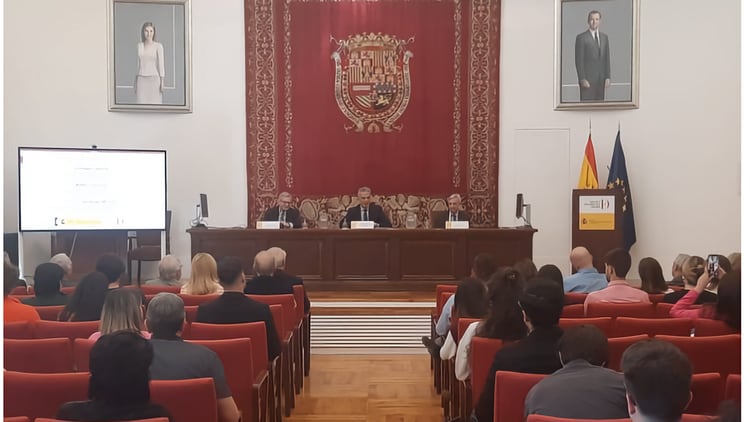Alba Córcoles
“When one hegemonic power is in decline and another is on the rise, the tension between the two for primacy can lead to conflict,” explained Santiago Miralles, alluding to the plot of Thucydides’ Trap. With this theory by American political scientist Graham Allison, the ambassador director of the Diplomatic School created a parallel with the tensions between the United States and China.
The confrontation between the two powers was the main topic of the debate “Relations between the US and China” that took place in the auditorium of the Diplomatic School headquarters, before a hundred attendees. Moderated by Miralles, Santiago Cabanas, former ambassador of Spain in Washington, and Rafael Dezcallar, former ambassador in Beijing, participated in the meeting.
Cabanas pointed out that “for the United States it is an incipient threat that its main opponent seeks to end North American hegemony and alter the Westphalian-liberal order.” Faced with this, he assured that the US seeks to reduce dependence on it, but without falling into a diplomatic rupture. The former ambassador added that “the United States is strong and will resist, but its greatest enemy will be its own polarization.”
For his part, Rafael Dezcallar, referring to the presidential elections next November in the United States, commented that “the Chinese prefer Trump; “Since he is more ineffective than Biden, he has fewer international alliances due to his isolationism and unpredictable nature, and he has a marked preference for autocratic leaders.”
The diplomat reviewed some of the strengths and weaknesses of the Asian giant. He assured that “it is less dependent on external actors and has better connections with countries in the Global South.” He stressed that “being a great power, it will never be able to please everyone, but China is very sensitive to disagreement and manages very poorly that not everyone is happy with its decisions.”
Finally, Dezcallar highlighted the lack of precision of Western ideas about China: “What I have learned from China is that it cannot be measured with any mold that we know. We do not think alike and therefore we cannot apply our parameters to understand them.”
The former ambassadors agreed that there is “an inevitable confrontation between the first and second powers in the world,” since “while China argues that the United States robs it of its legitimate right to develop, the United States states that China is still far from a lot of Western values and charter of rights.” In a struggle between strategic rivals, “the US does not want to lose its privileged position, while China does not accept a secondary role,” Dezcallar concluded.






